普特—容易翻译错误的10个句子
盘点平常用英文容易翻译错的25个句子
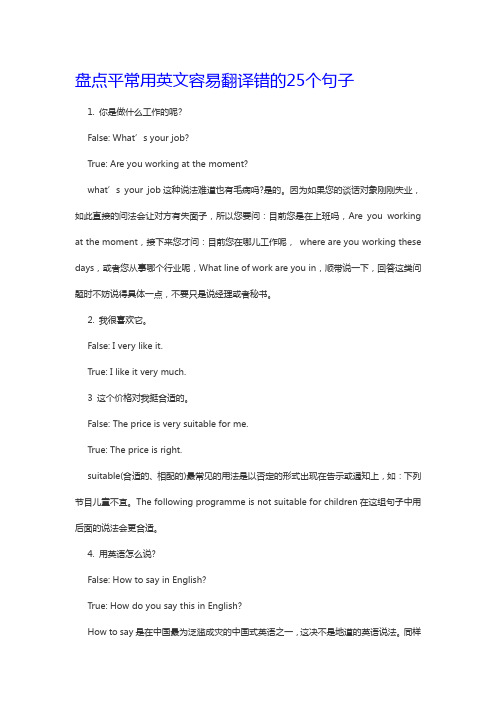
盘点平常用英文容易翻译错的25个句子1. 你是做什么工作的呢?False: What’s your job?True: Are you working at the moment?what’s your job这种说法难道也有毛病吗?是的。
因为如果您的谈话对象刚刚失业,如此直接的问法会让对方有失面子,所以您要问:目前您是在上班吗,Are you working at the moment,接下来您才问:目前您在哪儿工作呢,where are you working these days,或者您从事哪个行业呢,What line of work are you in,顺带说一下,回答这类问题时不妨说得具体一点,不要只是说经理或者秘书。
2. 我很喜欢它。
False: I very like it.True: I like it very much.3 这个价格对我挺合适的。
False: The price is very suitable for me.True: The price is right.suitable(合适的、相配的)最常见的用法是以否定的形式出现在告示或通知上,如:下列节目儿童不宜。
The following programme is not suitable for children在这组句子中用后面的说法会更合适。
4. 用英语怎么说?False: How to say in English?True: How do you say this in English?How to say是在中国最为泛滥成灾的中国式英语之一,这决不是地道的英语说法。
同样的句子有:请问这个词如何拼写,How do you spell that please,请问这个单词怎么读,How do you pronounce this word。
5. 明天我有事情要做。
False: I have something to do tomorrow.True: Sorry but I am tied up all day tomorrow.用I have something to do来表示您很忙,这也完全是中国式的说法。
CATTI考试-容易翻错的短语及句子
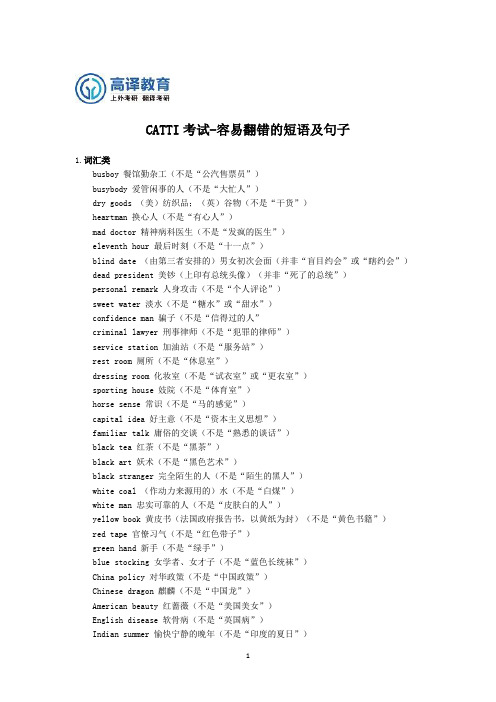
CATTI考试-容易翻错的短语及句子1.词汇类busboy 餐馆勤杂工(不是“公汽售票员”)busybody 爱管闲事的人(不是“大忙人”)dry goods (美)纺织品;(英)谷物(不是“干货”)heartman 换心人(不是“有心人”)mad doctor 精神病科医生(不是“发疯的医生”)eleventh hour 最后时刻(不是“十一点”)blind date (由第三者安排的)男女初次会面(并非“盲目约会”或“瞎约会”)dead president 美钞(上印有总统头像)(并非“死了的总统”)personal remark 人身攻击(不是“个人评论”)sweet water 淡水(不是“糖水”或“甜水”)confidence man 骗子(不是“信得过的人”criminal lawyer 刑事律师(不是“犯罪的律师”)service station 加油站(不是“服务站”)rest room 厕所(不是“休息室”)dressing room 化妆室(不是“试衣室”或“更衣室”)sporting house 妓院(不是“体育室”)horse sense 常识(不是“马的感觉”)capital idea 好主意(不是“资本主义思想”)familiar talk 庸俗的交谈(不是“熟悉的谈话”)black tea 红茶(不是“黑茶”)black art 妖术(不是“黑色艺术”)black stranger 完全陌生的人(不是“陌生的黑人”)white coal (作动力来源用的)水(不是“白煤”)white man 忠实可靠的人(不是“皮肤白的人”)yellow book 黄皮书(法国政府报告书,以黄纸为封)(不是“黄色书籍”)red tape 官僚习气(不是“红色带子”)green hand 新手(不是“绿手”)blue stocking 女学者、女才子(不是“蓝色长统袜”)China policy 对华政策(不是“中国政策”)Chinese dragon 麒麟(不是“中国龙”)American beauty 红蔷薇(不是“美国美女”)English disease 软骨病(不是“英国病”)Indian summer 愉快宁静的晚年(不是“印度的夏日”)Greek gift 害人的礼品(不是“希腊礼物”)Spanish athlete 吹牛的人(不是“西班牙运动员”)French chalk 滑石粉(不是“法国粉笔”)2.成语类pull one's leg 开玩笑(不是“拉后腿”)in one's birthday suit 赤身裸体(不是“穿着生日礼服”)an apple of love 西红柿(不是“爱情之果”)bring down the house 博得全场喝彩(不是“推倒房子”)have a fit 勃然大怒(不是“试穿”)make one's hair stand on end 令人毛骨悚然、恐惧(不是“令人发指、气愤”)be taken in 受骗,上当(不是“被接纳”)think a great deal of oneself 高看或看重自己(不是“为自己想得很多”)pull up one's socks 鼓起勇气(不是“提上袜子”)have the heart to do (用于否定句)忍心做……(不是“有心做”或“有意做”)3.表达方式类Look out! 当心!(不是“向外看”)What a shame! 多可惜!真遗憾!(不是“多可耻”)You don't say! 是吗!(不是“你别说”)You can say that again! 说得好!(不是“你可以再说一遍”)I haven't slept better. 我睡得好极了。
英语句子中最容易翻译错的语句
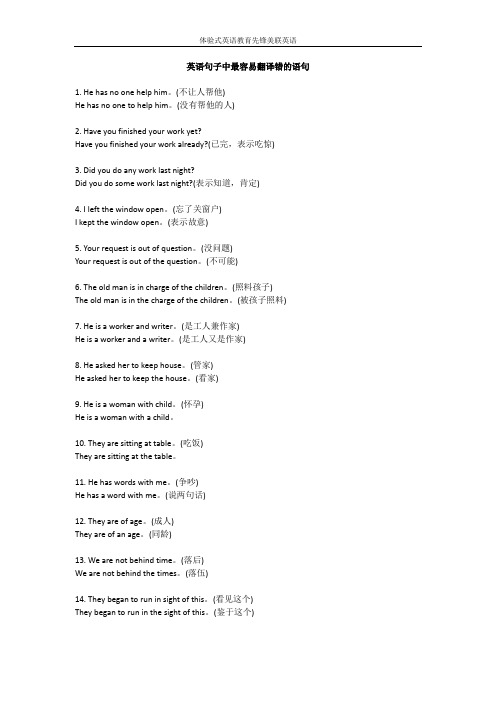
英语句子中最容易翻译错的语句1. He has no one help him。
(不让人帮他)He has no one to help him。
(没有帮他的人)2. Have you finished your work yet?Have you finished your work already?(已完,表示吃惊)3. Did you do any work last night?Did you do some work last night?(表示知道,肯定)4. I left the window open。
(忘了关窗户)I kept the window open。
(表示故意)5. Your request is out of question。
(没问题)Your request is out of the question。
(不可能)6. The old man is in charge of the children。
(照料孩子)The old man is in the charge of the children。
(被孩子照料)7. He is a worker and writer。
(是工人兼作家)He is a worker and a writer。
(是工人又是作家)8. He asked her to keep house。
(管家)He asked her to keep the house。
(看家)9. He is a woman with child。
(怀孕)He is a woman with a child。
10. They are sitting at table。
(吃饭)They are sitting at the table。
11. He has words with me。
(争吵)He has a word with me。
(说两句话)12. They are of age。
中国人最易犯的汉译英错误

9.忽 9.忽…忽, 这些日子天气多变,忽冷忽热。 这些日子天气多变,忽冷忽热。 The weather is suddenly cold and then hot those days. The weather is changeable these days, now cold, now warm. 他的情绪不断变化,忽喜忽悲。 他的情绪不断变化,忽喜忽悲。 His moods kept changing, now happy, now sad.
12.晒黑 12.晒黑 我的皮肤晒得比你黑。 我的皮肤晒得比你黑。 My skin has become blacker than yours. I’ve got a more tanned skin than you. I’ve got more tanned than you.
中国人最容易犯的汉译英错误
1.容易 1.容易 冬天,人们容易感冒。 冬天,人们容易感冒。 In winter, people are easy to catch cold. In winter, people tend to catch. In winter, people are tending to catch cold. In winter, people arቤተ መጻሕፍቲ ባይዱ apt to catch cold. In winter, people are liable to catch cold.
(3)体现或反映(某种方向或利益) (3)体现或反映(某种方向或利益) 体现或反映 例:三个代表 Three Represents The Party should always represent the development needs of China’s advanced social productive forces, always represent the onward direction of China’s advanced culture, and always represents the fundamental interests of the largest number of the Chinese people.
汉译英最易翻译错的句子
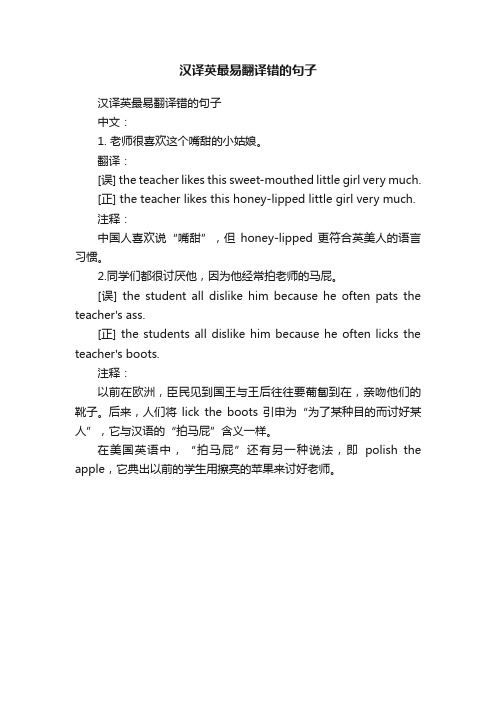
汉译英最易翻译错的句子
汉译英最易翻译错的句子
中文:
1. 老师很喜欢这个嘴甜的小姑娘。
翻译:
[误] the teacher likes this sweet-mouthed little girl very much.
[正] the teacher likes this honey-lipped little girl very much.
注释:
中国人喜欢说“嘴甜”,但honey-lipped 更符合英美人的语言习惯。
2.同学们都很讨厌他,因为他经常拍老师的马屁。
[误] the student all dislike him because he often pats the teacher's ass.
[正] the students all dislike him because he often licks the teacher's boots.
注释:
以前在欧洲,臣民见到国王与王后往往要葡匐到在,亲吻他们的靴子。
后来,人们将lick the boots 引申为“为了某种目的而讨好某人”,它与汉语的“拍马屁”含义一样。
在美国英语中,“拍马屁”还有另一种说法,即polish the apple,它典出以前的学生用擦亮的苹果来讨好老师。
高中英语易译错的句子
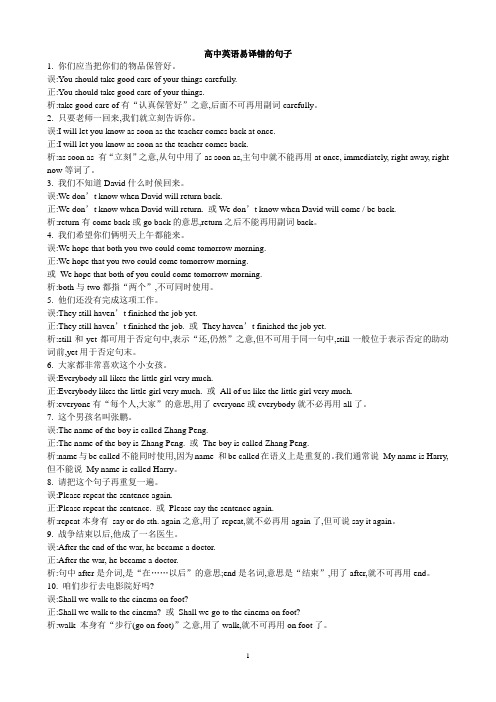
高中英语易译错的句子1. 你们应当把你们的物品保管好。
误:You should take good care of your things carefully.正:You should take good care of your things.析:take good care of有“认真保管好”之意,后面不可再用副词carefully。
2. 只要老师一回来,我们就立刻告诉你。
误:I will let you know as soon as the teacher comes back at once.正:I will let you know as soon as the teacher comes back.析:as soon as 有“立刻”之意,从句中用了as soon as,主句中就不能再用at once, immediately, right away, right now等词了。
3. 我们不知道David什么时候回来。
误:We don’t know when David will return back.正:We don’t know when David will return. 或We don’t know when David will come / be back.析:return有come back或go back的意思,return之后不能再用副词back。
4. 我们希望你们俩明天上午都能来。
误:We hope that both you two could come tomorrow morning.正:We hope that you two could come tomorrow morning.或We hope that both of you could come tomorrow morning.析:both与two都指“两个”,不可同时使用。
5. 他们还没有完成这项工作。
容易翻译错误的10个英语句子
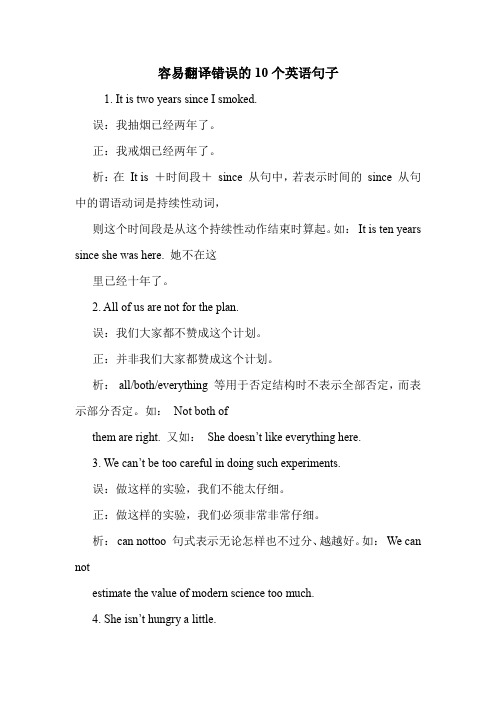
容易翻译错误的10个英语句子1. It is two years since I smoked.误:我抽烟已经两年了。
正:我戒烟已经两年了。
析:在It is +时间段+since 从句中,若表示时间的since 从句中的谓语动词是持续性动词,则这个时间段是从这个持续性动作结束时算起。
如:It is ten years since she was here. 她不在这里已经十年了。
2. All of us are not for the plan.误:我们大家都不赞成这个计划。
正:并非我们大家都赞成这个计划。
析:all/both/everything 等用于否定结构时不表示全部否定,而表示部分否定。
如:Not both ofthem are right. 又如:She doesn’t like everything here.3. We can’t be too careful in doing such experiments.误:做这样的实验,我们不能太仔细。
正:做这样的实验,我们必须非常非常仔细。
析:can nottoo 句式表示无论怎样也不过分、越越好。
如:We can notestimate the value of modern science too much.4. She isn’t hungry a little.误:她一点也不饿。
正:她非常饿。
析:not a little 意为很、非常。
not a bit 和not in the least 则意为一点也不。
如:She isn’t hungry a bit.5. The man is too strong not to lift the box up.误:这个人力气不够大,不能把这只箱子提起来。
正:这个人力气很大不会提不起这只箱子。
析:toonot to do 结构表示很不会不、非常必然会的意思。
tooto do 结构则表示太而不能的意思。
盘点平常用英文容易翻译错的16个句子

盘点平常用英文容易翻译错的16个句子由于中外文化的差异,我们在学英语时的一直有直译习惯,导致出现一些常用的英文容易翻译错,翻译出来的单词和句子跟英文本身的含义大相径庭,我们一起来感受一下吧!英语中有很多用法,如果照字面意思翻译,译文会与实际含义存在差异,甚至大相径庭。
所以掌握这些特殊用法,也是英语学习的重要一课。
特别是下面这些常见特殊用法,不妨测试一下,看看自己有没有用错?1.It's a good father that knows his son.误:了解自己儿子的父亲都是好父亲。
正:好父亲也未必了解自己的儿子。
2.I have no opinion of that sort of man.误:我对那种人没有想法。
正:我对那种人没有好感。
3.Do you have a family?误:你有家人吗?正:你有儿女吗?4.What a shame!误:太可耻了!正:太遗憾了!5.You can say that again!误:你可以再说一次!正:说得好太对了!6.I haven't slept better.误:我睡的不怎么好。
正:我睡得好极了。
(我从未睡过这么好的觉。
)7.You can't be too careful in your work.误:你工作时不能太细心。
正:你工作时越细心越好。
8.It has been4years since I smoked.误:我抽烟有4年了。
正:我戒烟有4年了。
9.England is not agreeing with her.误:英国不同意/欢迎她。
正:她在英国水土不服。
10.You really flatter me.误:你一定在奉承我。
正:你让我受宠若惊。
11.You cannot give him too much money.误:你不能给他太多钱。
正:你给他再多的钱也不算多.12.You look darker after the holiday.误:假期之后你变黑了。
- 1、下载文档前请自行甄别文档内容的完整性,平台不提供额外的编辑、内容补充、找答案等附加服务。
- 2、"仅部分预览"的文档,不可在线预览部分如存在完整性等问题,可反馈申请退款(可完整预览的文档不适用该条件!)。
- 3、如文档侵犯您的权益,请联系客服反馈,我们会尽快为您处理(人工客服工作时间:9:00-18:30)。
容易翻译错误的10个句子
1. It is two years since I smoked.
误:我抽烟已经两年了。
正:我戒烟已经两年了。
析:在“It is +时间段+since 从句”中,若表示时间的since 从句中的谓语动词是持续性动词,则这个时间段是从这个持续性动作结束时算起。
如:It is ten years since she was here. 她不在这里已经十年了。
2. All of us are not for the plan.
误:我们大家都不赞成这个计划。
正:并非我们大家都赞成这个计划。
析:all/both/everything 等用于否定结构时不表示全部否定,而表示部分否定。
如:Not both of them are right. (并非他们两人都是对的。
)又如:She doesn't like everything here. (她并非喜欢这里的一切。
)
3. We can't be too careful in doing such experiments.
误:做这样的实验,我们不能太仔细。
正:做这样的实验,我们必须非常非常仔细。
析:“can not……too……”句式表示“无论怎样也不过分”、“越……越好”。
如:We can not estimate the value of modern science too much. (对于现代科学的价值,我们无论作怎样的评价也不算过分。
)
4. She isn't hungry a little.
误:她一点也不饿。
正:她非常饿。
析:“not a little ”意为“很”、“非常”。
“not a bit ”和“not in the least ”则意为“一点也不”。
如:She isn't hungry a bit. (她一点也不饿。
)
5. The man is too strong not to lift the box up.
误:这个人力气不够大,不能把这只箱子提起来。
正:这个人力气很大不会提不起这只箱子。
析:“too……not to do……”结构表示“很……不会不……”、“非常……必然会……”的意思。
“too……to do ”结构则表示“太……而不能”的意思。
试比较:Lin Dong is too wise not to work out the problem. (刘东很聪明,不会算不出这道题。
)I am too tired to walk. (我太累了,走不动了。
)
6. He isn't a farmer and a worker.
误:他不是工人也不是农民。
正:他是工人不是农民。
析:“not A and B ”表示“不是A 而是B ”。
“not A or B ”表示“不是A 也不是B ”。
比较:He isn't a farmer or a worker. (他不是个农民也不是个工人。
)
7. She is no musician.
误:她不是个音乐家。
正:她不懂音乐。
析:在“She is no musician ”这样的句子里,no 并不是否定某种职业或类属,而是否定从句从事某种职业的人的素养或天份,即表示主语具有表语所表达的人或事物的相反的属性。
如:He is no scholar. (他不学无术。
)He is no fool. (他很聪明。
)He isn't a scholar. (他不是个学者。
)He is not a fool. (他不是个笨人。
)
8. Rose is no less diligent than her elder sister.
误:罗斯跟她姐姐一样都不用功。
正:罗斯跟她姐姐一样用功。
析:“no less……than ”表示“同……一样”。
如:She is no less beautiful than her elder sister. 她跟她姐姐一样漂亮。
“no more than ”可以表示“与……一样都不……”的意思。
如:Tom is no more careful than Bob. (汤姆不仔细,鲍勃也不仔细。
)
9. I don't believe Miss Hong will be the last but two in the examination in her class.
误:我不相信洪小姐将会在班里考倒数第三名。
正:我相信洪小姐将不会在班里考倒数第三名。
析:think,believe,suppose,expect 和feel 都是表示信念、推测、愿望等心理活动的动词。
若要否定其后的宾语从句,则常将否定词转移到主句中去。
如:I don't think you are right. (我认为你不对。
)
10. Tell me what the matter is.
误:告诉我怎么啦?
正:告诉我物质是什么?
析:“What the matter is ”表示“物质是什么”,而“what is the matter ?”则表示“怎么啦?”。
更多语法资料,请查看/html/ability/grammar/index.html。
